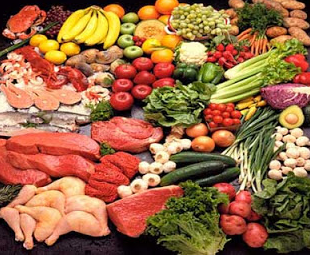General Principles
The main principles of nutrition for blood stagnation patterns are similar to those of qi stagnation. Foods and practices that congest the Liver, impair the circulation of qi and blood, or cool and constrict the vessels should be avoided.
Foods that disperse stagnant Blood are, in general, pungents and/or warming. The warmer elements like cayenne, ginger, and garlic should be used with caution when there is complicating Heat or yin deficiency. Care must also be taken with an overly dispersing diet when blood stagnation is complication of, or be complicated by other pathologies. In such cases, rather than emphasising Blood moving foods as a primary theme of the diet, a few appropriate foods from the list below can be added to whatever diet is suitable. Of course, if Blood stagnation is the primary pathology, a stronger emphasis may be placed on dispersing foods initially, until the stagnation begins to shift. As the patient improves, the diet can then be adjusted accordingly.
Certain foods are thought to be especially beneficial for various types of cancer. This may be because they are salty, and therefore soften hardness and aid in the dispersal of masses, or because they have immune stimulating properties. Others are known to have levels of natural antioxidants. The addition of one or more of these items to an appropriate diet may be useful.
|
General comments |
Eat smaller meals more frequently, eat heavier meals earlier in the day, concentrate on light and mildly spiced foods, stir fry, poach and steam, high vegetable, low carbohydrate, low meat. |
|
Beneficial |
turmeric, shallot, scallion, leek, chives, ginger, taro, eggplant, basil, cayenne, nutmeg, oregano, rosemary, white pepper, aduki bean, chestnut, crab, red wine (in small quantities), watercress, horseradish, cumin, cardamom, fennel, dill, fresh ginger, sour cherries, plums, plenty of fresh vegetables, cauliflower, broccoli, brussel sprouts, beetroot, sprouted grains, asparagus, taro, cabbage, turnip, sourdough rye bread, extra virgin olive oil, molasses, small amounts of high quality meat, protein, fish. |
|
Uterus |
eggplant, kelp, seaweeds, black fungus (wood ears) |
|
Restrict or Avoid |
Foods high in saturated fats and oils: cheese, eggs, cream, ice cream, red meats, lard, shortening margarine, nuts, pizza, hot chips. Excessive cold or refrigerated food: ice cream, beer, salads and raw vegetable juices, white wine. |
Anticancer
|
Generally beneficial |
green tea, oolong tea, radish, ginger, pepper, vinegar, light salting, a little wine, watermelon, tomatoes, pears, waterchestnuts, fungus of all kinds (mushrooms, wood ears, ec.), aduki beans, lotus seeds, chinese barley (job’s tears) |
|
Salty, to soften masses |
crab, jellyfish, kelp, laver, mussel, clam, sea cucumber (beche de mer, trepat), abalone, hawthorn |
Protein,seeds, nuts, dairy: 10%+
Vegetables, fruits: 40-60%+
Carbohydrate: 30%



